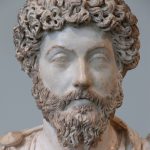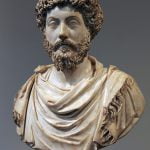Chapters
Marcus Aurelius, the Roman emperor who reigned from 161 to 180 CE, went down in history not only as a just ruler but also as one of the greatest philosophers of antiquity. His work Meditations is a collection of reflections that he wrote mainly for himself, to cultivate his inner life. It is an extremely intimate record of thoughts that refer to everyday struggles, and reflections on the nature of man and the world and the meaning of life. Meditations are deeply rooted in Stoic philosophy, and at the same time constitute a practical guide to ethics and morality.
Philosophy of stoicism
To understand Meditations, we need to look at the philosophy that Marcus Aurelius espoused – stoicism. Stoicism, a philosophical school founded in the 3rd century BCE by Zeno of Citium, proclaimed that virtue and life by nature are the most important goals of human existence. The Stoics believed that humans had no control over external circumstances, but they could control their reactions and emotions. The key principles of this philosophy are:
- Virtue as the highest good: Virtue (virtus) is the only true good, and everything else is either indifferent or deceptively valuable.
- Acceptance of fate: Fate (fatum) is inevitable, so you should accept it and maintain peace of mind in every situation.
- Emotional control: People should strive for apatheia, a state free from harmful emotions such as anger, fear or jealousy.
For Marcus Aurelius, who had to face the hardships of being emperor, stoicism was not only a philosophy but a way to survive.
Main motifs in “Meditations”
In his Meditations, Marcus Aurelius focuses on several key themes that reveal his reflections on life, the nature of humanity, and the duties of the emperor and man.
Transience and mortality
One of the central motifs of Meditations is transience. Marcus Aurelius regularly reminds himself that life is short and fleeting. In the face of this impermanence, he recommends peace and acceptance of death as a natural element of life.
Duty to the community
As emperor, Marcus Aurelius saw himself not only as a ruler but above all as a servant of the people. Stoic philosophy emphasized the importance of community, and Marcus believed that it was his duty to care for the common good. In Meditations, he often returns to the idea that each person is part of a larger whole and should strive for social good.
Self-control and peace of mind
Stoicism taught that man’s greatest challenge was to control his emotions and remain calm in the face of difficulties. Marcus Aurelius wrote many times about the need to distance himself from everyday problems. For Marek, the key to happiness was internal stability, immobility in the face of events over which he had no influence.
The pursuit of virtue
For the Stoics, living a life of virtue was the most important goal, and Marcus Aurelius often reminded himself to strive for moral perfection. No matter how difficult his duties as emperor were, he tried to be honest, fair and understanding.
“Meditations” as a guide in today’s world
Although Marcus Aurelius lived over 1,800 years ago, his reflections remain extremely current. Meditations are not only philosophical reflections but also practical tips on dealing with everyday stress, difficulties and disappointments. The modern world, with its noise, pressure and chaos, seems to be an ideal place to apply Stoic principles. Feelings of overwhelm, frustration, or uncertainty about the future can be alleviated with a stoic attitude – accepting what cannot be changed and focusing on what is within our control.
Summary
Meditations of Marcus Aurelius is not only a philosophical work, but also a unique spiritual testament of a man who, while at the top of power, tried to live modestly and virtuously. His thoughts remind us that despite external circumstances, the greatest fight takes place within ourselves – to maintain peace, honesty and harmony with the surrounding world. The stoicism of Marcus Aurelius inspires us to reflect on what has value and how we can find peace in every life situation.







